A year ago I wrote my first response to the Oscar nomination results. In my introduction I observed two things: my frustration that certain films didn’t get nominated, as well as my mixed feelings about the very concept of awards. This year little has changed. While two of the year’s best represented Oscar films Jojo Rabbit and Marriage Story are actually amongst my favorites, it is still hard for me not to notice frustrating patterns in what does and doesn’t make the cut. For instance, is Jojo Rabbit actually markedly better than Taika Waititi’s past work, or is it just because he’s backed by Fox Searchlight Pictures and cast Scarlett Johansson, Sam Rockwell and Rebel Wilson in place of lesser-known New Zealander actors that the Academy decided he’s finally worth paying attention to?
But as with last year, my cynicism about the very idea of ranking movies, let alone following an over-celebrated award show of limited scope, is topped by my eagerness to participate in a discussion about film, so without further ado…
BEST ACTOR IN A SUPPORTING ROLE
In 2017 I wrote of the absurdity of Willem Dafoe getting the only acting nomination amongst the cast of The Florida Project despite writer-director Sean Baker’s commitment to showcasing amateur talents. My feelings about Scarlett Johansson getting the only acting nomination amongst the cast of Jojo Rabbit are similar.
Alas, not only does the Oscars seem to have a bias against nominating non-famous people, but it also seems to have a bias against nominating comedic actors. I would thus like to highlight Taika Waititi’s worthiness for the Best Actor in a Supporting Role award.
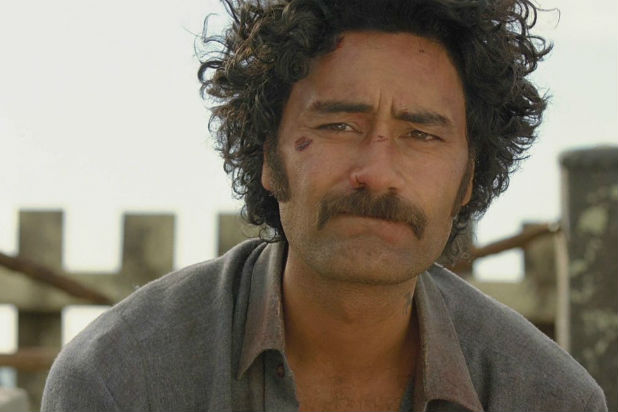
Taika Waititi gets my nod for his role in Jojo Rabbit…sort of
Waititi’s role which, due to being a figment of a child’s imagination, both does and doesn’t resemble the real Adolph Hitler, is undoubtedly a unique one and is brought to life via Waititi’s unique comic voice.
I hesitate a bit with this pick since it can be argued that Waititi’s goofy-Hitler role did not particularly push his acting skills to the limit. That said, it is not unheard of for Oscars to implicitly be given based on a cumulation of works (before they finally won, Martin Scorsese and Leonard DiCaprio were marked with buzz of, “will this finally be the year?”) Taika Waititi’s strongest acting came in his second film, Boy, in which he plays a goofy, yet-hardened absentee father. There’s notably a scene in Boy in which Waititi reveals a hidden swastika he stuck to the wall, before awkwardly telling his son, “don’t get into that Nazi stuff.” Given this intertextual relationship between the two films, I see no issue in using Jojo Rabbit as the opportunity to honor Waititi for his cumulative acting work.
Other notable supporting performances this year include Will Smith’s lively Genie from Aladdin, and Kevin Garnett’s uniquely serious portrayal of “himself” in Uncut Gems.
BEST ACTRESS IN A SUPPORTING ROLE
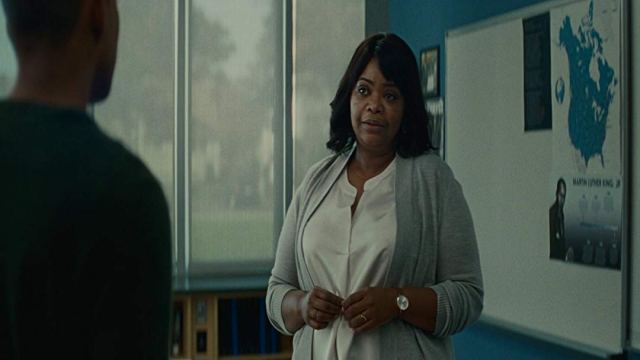
Octavia Spencer in Luce
It feels weird to begrudge the Oscars for ignoring Octavia Spencer. When she was nominated for playing a generic best-friend role in The Shape of Water two years ago, I couldn’t help but the feel the Academy had decided she was one of the people they were supposed to nominate by default (while ignoring less famous actors in the process). That said, this year Octavia Spencer starred in what could be the year’s most underrated release: Luce. Luce uniquely blends substantive social commentary, with the moral ambiguity of horror/thriller movies, and Spencer, in her passionate portrayal of a disciplinarian, yet socially-conscious teacher, provides a key component of that film’s immense emotional weight.
Returning to the problem of the Oscars ignoring “less famous” actors, one of the shocks of the season was seeing no nomination go to any member of The Farewell’s cast. While a lot of attention has rightly been paid to the film’s central Grandmother (Zhao Shuzhen), I found the role that required the most nuance in the film was that of the protagonist Billie’s mother, portrayed by Diana Lin. The character, on the one hand, is the most representative of the “family-that-doesn’t-understand,” yet Lin and the script draw a nice balance by the portraying the mother as never quite as strict as Billie expects her to be.
Other memorable “supporting actress” performances include Uncut Gems’ newfound star Julia Fox, whose character shift midway through the story gives the chaotic film its “meaning,” and Chloe Sevigny, whose vulnerability adds important emotional variety to Jim Jarmusch’s not-for-everybody-deadpan-zombie-movie The Dead Don’t Die.
BEST ACTOR IN A LEADING ROLE
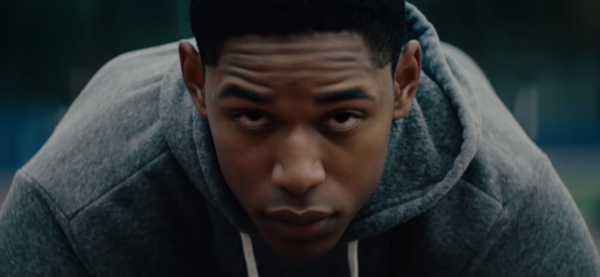
Kelvin Harrison Jr. in Luce
I’ve said it a million times on this blog, but as far as I’m concerned Kelvin Harrison Jr. is cinema’s biggest breakout star of 2019. In Luce he balanced vulnerability with terrifying moral ambiguity, serving as Octavia Spencer’s foil. In Waves he plays a similar, yet-markedly-different role as a character who has no horror-movie traits, yet finds himself in a horrifying situation. That neither of these movies earned Harrison a nomination is, in my mind, the best argument for imposing requirements that academy members who don’t see a certain percentage of the year’s releases lose their voting rights.
Another interesting candidate, who fell victim to not-famous (in America) bias is Parasite’s Song Kang-Ho. Song plays a character who superficially resembles the goofy-tv dad trope, yet is enough of a thinker to ascend to being one of his film’s key moral players (for better or for worse).
I would be remiss not to mention Joaquin Phoenix’s portrayal of Joker, even if that’s one that has not flown under the Academy’s radar. Phoenix had to take on the challenges of turning cartoon traits into realistic ones, portraying a figure who is simultaneously weak and powerful, and embodying a character who loses his moral senses but never his sense of morality. Adam Sandler’s snub for Uncut Gems, meanwhile, while not an example of “not-famous” bias, might as well be the same thing. While film fans and auteurs might have been thrilled to see Sandler and Garnett show their potential as dramatic actors, it seems the Academy would rather people know their places. Finally, while I’ll stand by my view that the Academy should avoid nominating kids for their own mental well being, its hard to ignore Roman Griffin Davis’s performance as Jojo in Jojo Rabbit, his diverse array of emotions always on point (his co-star Archie Yates, would also be a good fit in the supporting category but-for anti-comedy bias).
BEST ACTRESS IN A LEADING ROLE
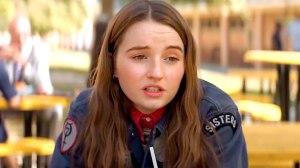
Kaityln Dever in Booksmart
Booksmart may be an over-the-top comedic film, but its resonance with me has always been for its realness. Kaitlyn Dever’s performance as Amy is the film’s most realistic element. While “geek” films are often populated by characters who simply seem to be outcast frat-boys, Dever’s mild-mannered, yet charismatically awkward portrayal finally breaks that mold.
Park So-Dam meanwhile, delivered one of the year’s most memorable lines: “Jessica, only child, Illinois, Chicago.” Immortalized simply in Parasite’s trailer those words take a new meaning on screen, as Park stars as a cool, gifted-schemer, who at the right moments, nonetheless shows her vulnerability as a child/very-young adult.
While I think Her Smell made a mistake in over-centering itself on one of its characters, that mistake came with benefits. Elisabeth Moss’s portrayal of a troubled-rock star is highlighted by her friendly demeanor, and has a unique power to it given that, contrary to the tropes, the character she portrays is not necessarily a huge star and is also (to state the obvious) a woman.
BEST CINEMATOGRAPHY
The easy choice here is The Lighthouse (Jarin Blaschke), a film whose appeal is that it presents as a series of black and white photographs populated by the comedically dressed Willem Dafoe and Robert Pattinson. I suppose my hesitancy with this one is simply the question of how much of its beauty simply owes to its being black and white? (And if I were to catastrophize, could the over-celebration of The Lighthouse result in too many films being made in black and white, thus ruining the novelty of the effect?).

Woman at War
Anyway, I’m not going to make a forced choice here. Cinematography was almost cut from the Oscars in the recent past, so I feel compelled to acknowledge it, but that’s as far as I’ll go. Amongst other strong cinematographic choices this year was the non-noirness of Jojo Rabbit (Mihai Mălaimare Jr.), the use of bright colors in ordinary settings in Pain and Glory (José Luis Alcaine), the combination of surreal, high-tech, and retro-grayness in Ad Astra (Hoyte van Hoytema), the combination of mythic art with rural expanses in Midsommar (Pawel Pogorzelski), the celebration of Iceland’s mossy hills in Woman at War (Bergsteinn Björgúlfsson), and the naively lulling shots of color tinged water in Waves (Drew Daniels).
BEST CHILDREN’S FILM
Every year I say it: “best animated picture” is a bad category. My view, is that as the one award which will have nominees that children will care about, that this award should always go to a children’s film. That said, this leaves no niche for brilliant animation not aimed at young viewers. The Academy seemingly agrees with me. Thus, the oil-painted Loving Vincent was nominated but not awarded, while my favorite animated film of this year, the cubist, alt-heist movie Ruben Brandt: Collector has been ignored by the Academy entirely.
Brandt aside, this was a good year for animated movies, even as it was rife with sequels. How to Train Your Dragon 3 featured excellent inter-character dynamics. Toy Story 4 successfully extended its series’ philosophical journey, mitigating some of the disappointment that it wasn’t the change-of-pace rom-com it was once promised to be. Finally, The Lego Movie 2: The Second Part continued the strong visual precedent set by its predecessors while also finding ways to extend its universe’s moral exploration and giving star Chris Pratt a surprisingly interesting voice acting assignment.
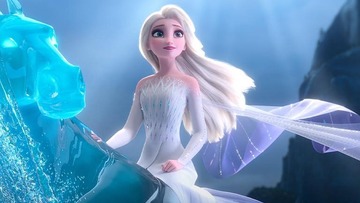
Frozen 2
But if I had to pick a “best” out of this strong field, I’d go with Frozen II. While its hard to see Disney as an underdog, in this case, Jennifer Lee told what, for her industry, was a new kind of story: one that centred an indigenous people’s relationship to the land around them, in place of typical fairy-tale/hero’s journey plot arc dynamics. More importantly, Frozen II challenged the notion that children’s films have to be unhappy to be profound (that’s my gripe with Toy Story 4, and to a lesser extent, with the entire second generation of Pixar’s output). Frozen II shows that justice need not be something to fear. That coupled with its beautiful animation and its success in giving character depth to its goofy-snowman-sidekick, make this Oscar snub worthy of more recognition.
BEST SCREENPLAY
I don’t always feel comfortable engaging with the best screenplay and best directing categories. Directing especially, without a film insider’s eye, feels like an impossible characteristic to separate from the overall quality of the film. Similarly, I have a hard time imagining there being a year where my favorite film is not also my favorite film script.
That said, there are few Hollywood
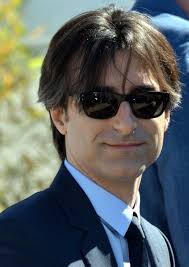
Noah Baumbach
screenwriters like Noah Baumbach. Aside from the fact that they tend to have successful artistic careers, his protagonists tend to be fairly ordinary people, whose dramas rarely ascend to the levels of action, horror or magic. To endear his mundane protagonists, Baumbach has had to learn to write with realist precision, giving the limited drama that does come out in his work its full emotional weight. With Marriage Story I think Baumbach has achieved about as much drama as his style can. It may not be my favorite movie of the year, but it comes close,
BEST DIRECTOR
Again, I find the task of “separating” best  director and “best picture absurd,” but since I’m also not one who loves picking favorites, I have no problem with picking two bests. Diamantino has an unpredictable and witty story, but co-writers Gabriel Abrantes and Daniel Schmidt also saw to it that the film included emotionally resonant performance and some of the year’s most eccentric visuals. While the film was on the studio circuit in 2018, I count it as a 2019 film given that it didn’t make it to my local (Montréal) theatres until late April 2019. And of course, it doesn’t seem like the Academy gave this underrated masterpiece much consideration in either year.
director and “best picture absurd,” but since I’m also not one who loves picking favorites, I have no problem with picking two bests. Diamantino has an unpredictable and witty story, but co-writers Gabriel Abrantes and Daniel Schmidt also saw to it that the film included emotionally resonant performance and some of the year’s most eccentric visuals. While the film was on the studio circuit in 2018, I count it as a 2019 film given that it didn’t make it to my local (Montréal) theatres until late April 2019. And of course, it doesn’t seem like the Academy gave this underrated masterpiece much consideration in either year.
BEST PICTURE (TBA)…